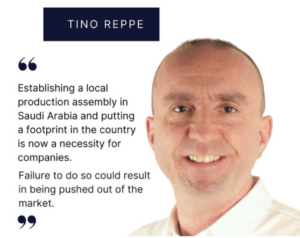
Valuable insights for german-speaking companies: Yes
An interview with Senior Vice President of WIKA, Tino Reppe
Are you a German-speaking company considering expanding your business into the Middle East? Keep an eye on Saudi Arabia, a rapidly growing economy with a business-friendly environment. But where do you begin?
Senior Vice President of WIKA and expert of the Middle East and North Africa region, Tino Reppe, played a significant role in setting up and developing WIKA’s business operations in Saudi Arabia. He now has shared his valuable insights and experiences in an interview with our Managing Partner MEAI Marie-Christin Gabel.
According to Mr. Reppe, Saudi Arabia is a highly significant market for many companies, including his company WIKA (a German manufacturer of measuring instruments). Establishing a local presence is essential for serving clients (eg. Saudi Aramco and Sabic) not just regionally. Aramco, in particular, is a significant customer for WIKA, as many EPCs contractors from countries such as Italy, Spain, Korea and Japan deal with them. However, in order to maintain and increase a companies’ market share, it is essential to keep up with Saudi Aramco’s IKTVA program. This programme includes various initiatives aimed at promoting the localization of technologies and production to increase investment, economic diversity and employment opportunities within KSA. The trend in Saudi Arabia is that the requirements of these programs are becoming more stringent, making it necessary for companies to establish a local production assembly and put their footprint in the country. Failure to do so could lead to being pushed out of the market.
When Tino Reppe refers to establishing a presence for WIKA in Saudi Arabia, he was primarily discussing the creation of a manufacturing or assembly facility. While establishing a manufacturing or assembly facility is possible, it requires extensive research and planning. Acquiring a license from the Investment Authority, to establish a company with a Commercial Registration (CR) in Saudi Arabia is a relatively straightforward process and can be completed in a matter of months. However, the more challenging aspect lies in finding a suitable location, obtaining necessary approvals from several ministries and other related tasks. These can be time-consuming and difficult. Additionally, the process of
Saudisation, which mandates that a certain percentage of Saudi nationals be employed by the company, can pose a challenge for HR, even though it is possible to find skilled local staff.

It is important to consider the consequences of not establishing a production or legal entity in Saudi Arabia. Without such a presence, the companies market share could shrink due to increasing Saudisation requirements, making it difficult to supply products to Saudi Arabia. Competitors who already have operations in the country would further capture the market.
So why should companies pursue this? There are several opportunities to consider. Firstly, there are significant developments in the field of gas which is the bridge from energy to renewables in the coming years. Saudi Arabia is one the world’s largest oil & gas producer with vast reserves. Additionally, hydrogen is poised to become the new black gold with enormous investments being made in the sector.
However, it is important to note that despite moving towards renewables and reducing carbon footprints, the global consumption of oil is set to increase from around 90 million barrels per day to more than 105 million per day by 2030. This means that there will still be significant investments made in the oil industry in the years to come.
If a German company intends to establish an entity in Saudi Arabia, the advice given by Tino Reppe depends on company´s current level of presence in the country. Based on his experience, he advises German-speaking companies with no presence, that the first step would be to establish a partnership and distribution network. For those companies already present with a partner network, the decision to move into local assembly or manufacturing can be made with the support of the professional Saudi Arabian General Investment
Authority. The ease of doing business in Saudi Arabia has improved greatly over the past five years, making it a better environment for foreign businesses.
In conclusion, expanding your business into Saudi Arabia requires careful planning and a deep understanding of the legal requirements, business practices, and cultural differences of the region. But with the right strategy and network on your side, Saudi Arabia can offer significant opportunities for companies looking to grow their business globally. Utilize Tino Reppe’s suggestions and insights to set your company up for success in Saudi Arabia.
Learn the latest about us and our projects around the world.
To never miss an opportunity, subscribe to our newsletter.